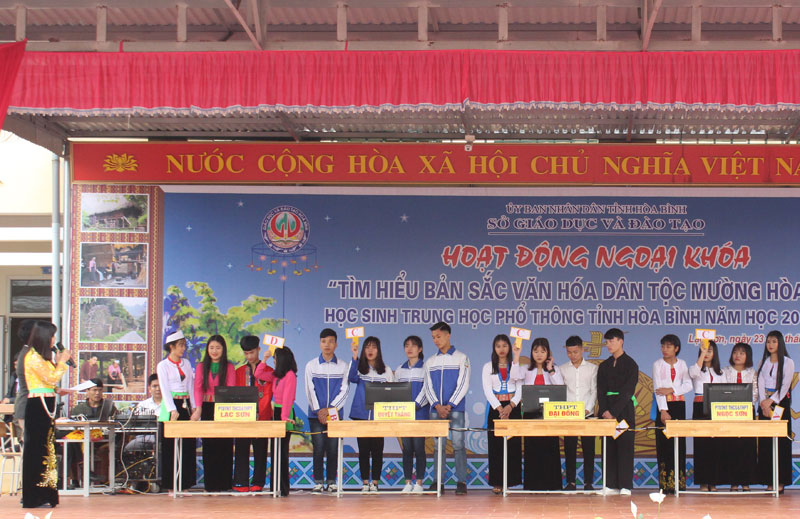


 The sector of education and training has been organizing the
extracurricular activities to learn about the cultural identity of Muong ethnic
people for high school students in the province.
The sector of education and training has been organizing the
extracurricular activities to learn about the cultural identity of Muong ethnic
people for high school students in the province.
According to the surveyed data, there are 2,180 officials and civil servants at the provincial and district levels in the whole province, including 802 civil servants who are ethnic minorities, which means that 1,378 non-ethnic cadres and civil servants should be fostered the language of Muong ethnic groups. The number of the communal cadres and civil servants and the health officials in the whole province is 5,946 people, of which 3,698 people are ethnic minorities.
It means that 2,248 cadres, full-time officials, communal officials and health servants are not the ethnic people, who need to be fostered the language of Muong ethnic people. The number of the civil and public servants and the associations at the provincial and district levels is 23,063 people, of which 11,808 people are ethnic minorities, which means 11,255 people need to be trained the language of Muong ethnic people. Thus, there is a total of 16,331 cadres, officials and civil servants are not Muong ethnic people who need to be trained the language of Muong.
In the short term, the project's target is the management staff at all levels (Muong ethnic people and other ethnic groups who need to learn Muong spoken language and writing) in the province; the officials and the civil servants; the students from high schools, the students from colleges and intermediate schools, the learners from the centers of continuing and vocational education in the province.
Talking about the implementation of this important project, Mr. Bui Van Cuu, the Vice Chairman of the Provincial People's Committee says that the Provincial People's Committee, firstly, has to assign tasks to the appropriate departments and authorities to advise the competent one on promulgating the regulations on granting certificates for the teachers and for the learners of Muong spoken language and writing based on the regulations of the Ministry of Education and Training. It is necessary to submit the application to the Ministry of Education and Training for the appraisal, allowing the organization of teaching and learning the spoken language and writing of Muong ethnic people in the locality. It is also necessary to develop a set of tools (the basic knowledge of the language, the understanding of Muong culture and customs) and the training and retraining programs of ethnic minority language (the writing) for the teachers who teach the language of the ethnic people as prescribed.
The province has also directed the related branches to coordinate in building a contingent of Muong ethnic language teachers in Hoa Binh province. They have urgently developed the plans and deployed the teaching of Muong ethnic language in the province to the school students, the college students, the cadres, the civil servants and the people throughout the province.
Currently, all sectors have been coordinating to build a team of the core experts and lecturers teaching Muong ethnic language from the departments and the appropriate authorities. At the same time, they have been building the documents, the general curriculum, the detailed programs and the textbooks in Muong language for each object of learners.
It is expected that about 500 Muong language teachers from the schools in the whole province will be trained. The pilot teaching and learning will begin at the boarding ethnic schools, some high schools, the centers of continuing and vocational education, Hoa Binh Teacher Training College and some other colleges from January 2021. It is expected to start the pilot teaching for the officials, the public servants and the employees in the whole province from May 2021.
At the end of May, the Hoa Binh Provincial Ethnic Arts Troupe organized a series of performances for residents in Region 2 and Region 3 communes across the province. Bringing art to ethnic communities in remote, isolated, and especially disadvantaged areas has become a meaningful activity. These are not merely artistic performances but also journeys to disseminate cultural values, enrich spiritual life, and contribute to preserving the cultural identity of ethnic minorities.